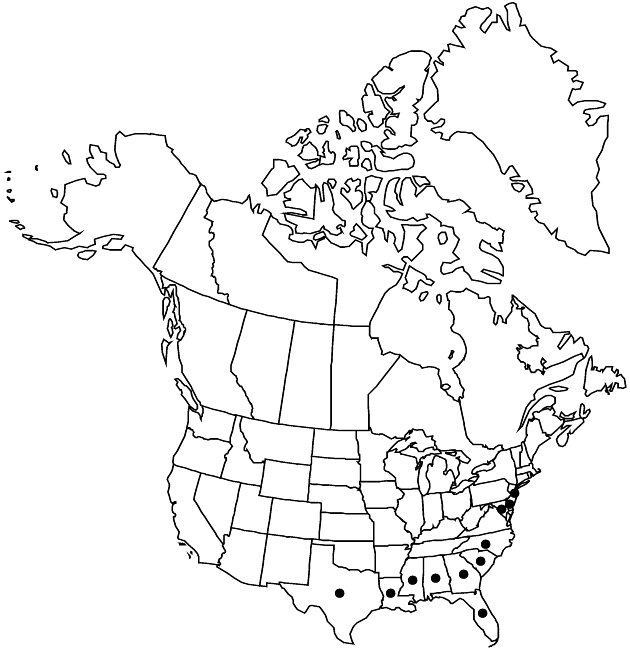Difference between revisions of "Heterotheca subaxillaris subsp. subaxillaris"
Synonyms: Chrysopsis scabra Elliott Diplopappus scaber Hooker Heterotheca chrysopsidis de Candolle Heterotheca lamarckii Cassini Heterotheca scabra (Pursh) de Candolle Inula scabra Pursh Stelmanis scabra Rafinesque
Treatment appears in FNA Volume 20. Treatment on page 235.
FNA>Volume Importer |
FNA>Volume Importer |
||
| Line 7: | Line 7: | ||
|name=Chrysopsis scabra | |name=Chrysopsis scabra | ||
|authority=Elliott | |authority=Elliott | ||
| − | }}{{Treatment/ID/Synonym | + | }} {{Treatment/ID/Synonym |
|name=Diplopappus scaber | |name=Diplopappus scaber | ||
|authority=Hooker | |authority=Hooker | ||
| − | }}{{Treatment/ID/Synonym | + | }} {{Treatment/ID/Synonym |
|name=Heterotheca chrysopsidis | |name=Heterotheca chrysopsidis | ||
|authority=de Candolle | |authority=de Candolle | ||
| − | }}{{Treatment/ID/Synonym | + | }} {{Treatment/ID/Synonym |
|name=Heterotheca lamarckii | |name=Heterotheca lamarckii | ||
|authority=Cassini | |authority=Cassini | ||
| − | }}{{Treatment/ID/Synonym | + | }} {{Treatment/ID/Synonym |
|name=Heterotheca scabra | |name=Heterotheca scabra | ||
|authority=(Pursh) de Candolle | |authority=(Pursh) de Candolle | ||
| − | }}{{Treatment/ID/Synonym | + | }} {{Treatment/ID/Synonym |
|name=Inula scabra | |name=Inula scabra | ||
|authority=Pursh | |authority=Pursh | ||
| − | }}{{Treatment/ID/Synonym | + | }} {{Treatment/ID/Synonym |
|name=Stelmanis scabra | |name=Stelmanis scabra | ||
|authority=Rafinesque | |authority=Rafinesque | ||
| Line 64: | Line 64: | ||
|publication year= | |publication year= | ||
|special status= | |special status= | ||
| − | |source xml=https://jpend@bitbucket.org/aafc-mbb/fna-data-curation.git/src/ | + | |source xml=https://jpend@bitbucket.org/aafc-mbb/fna-data-curation.git/src/8f726806613d60c220dc4493de13607dd3150896/coarse_grained_fna_xml/V19-20-21/V20_515.xml |
|tribe=Asteraceae tribe Astereae | |tribe=Asteraceae tribe Astereae | ||
|genus=Heterotheca | |genus=Heterotheca | ||
Revision as of 15:24, 18 September 2019
Outer and mid phyllaries with apical tuft of 6–28 coarse, scabro-strigose hairs, faces sparsely to densely stipitate-glandular. 2n = 18.
Phenology: Flowering (spring–)May–Dec.
Habitat: Sandy and gravelly soils, coastal dunes, disturbed ground, roadsides, vacant lots, fields, areas in pine and oak woods and scrub
Elevation: 0–100+ m
Distribution

Ala., Del., Fla., Ga., La., Md., Miss., N.J., N.C., S.C., Tex., Mexico.
Discussion
Subspecies subaxillaris is found on the outer coastal plains along the Gulf and Atlantic coasts from northern Mexico to Delaware. They are rarely more than 1 m and can be procumbent on dunes. Atypical spring-blooming plants often lack the distinctive distal tuft of coarse hairs on the phyllaries. The number of hairs in the tuft decreases from as many as 28 in Texas and Louisiana to 10–15 in Florida to 6–16 from Georgia to New Jersey.
Selected References
None.
Lower Taxa
None.
... more about "Heterotheca subaxillaris subsp. subaxillaris"
